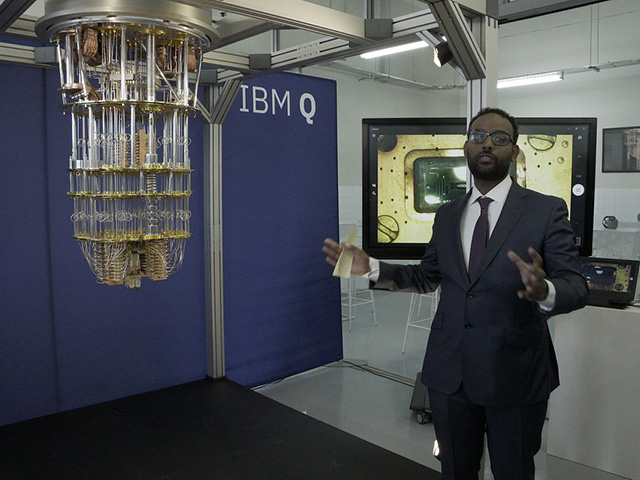South Africa’s Progress in becoming Quantum Ready begins with empowering the youth
By Industry Contributor 16 March 2021 | Categories: feature articles
By Dr. Solomon Assefa and Abe Asfaw
As we approach one year mark since South Africa was hit by the Covid-19 pandemic, that forced companies and organisations to adapt to digital transformation, as remote working, distance learning and e-commerce became the new normal amid the ongoing lockdown restrictions, we saw a surge in the use of IT services and solutions.
With this trend of accelerated digitisation poised to increase, the urgency for Africa to address the skills gap, by equipping the youth with the necessary skills to power the continent forward is vital. As this will unlock new market opportunities, shape the economy and in South Africa’s case aid economic recovery, however people need to be skilled adequately so as to accommodate emerging technologies.
Bridging the skills gap
Fundamentally, the skills gap is an education problem. It reflects a failure to prepare our workforce with the skills they need to thrive in a digital economy. Fortunately, a number of governments, nonprofit and educational institutions, as well as businesses, are working to shrink this gap. It’s only through investing in individuals and allowing them to bridge the digital divide - through digital access initiatives and advanced education curriculums can we ensure that the necessary skills are passed on.
While Artificial Intelligence and other emerging technologies such as IoT and cloud have been very disruptive in the digital acceleration of companies, Quantum computing is also expected to stimulate the developments of new breakthroughs in science, medications to save lives, machine learning methods to diagnose illnesses sooner, materials to make more efficient devices and structures, financial strategies to live well in retirement, and algorithms to quickly direct scarce vital resources such as ambulances.
in June 2019, IBM Quantum announced the expansion of its quantum computing efforts to Africa in a new collaboration with the University of the Witwatersrand (Wits University) in South Africa. Wits University became the first African academic partner in the IBM Quantum Network and a gateway for academic collaboration across South Africa with 15 additional universities who are part of the African Research Universities Alliance (ARUA).The goal was to enhance the skills of existing scientists and researchers.
The fruits of collaboration and partnership
This programme has enabled a number of milestones for example, two students from Stellenbosch University (which is part of the Africa Research universities Alliance (ARUA) Unathi Skosana and Conrad Strydom are testing small scale quantum algorithms to understand the limitations of the quantum bits or qubits due to noise and imperfections, with the hope that the findings would provide some answers about what is needed in processor performance for scaling up the algorithms for eventual applications in quantum chemistry for TB and HIV drug development.
With data breaches costing SA companies R40.2 million average in 2020 following the transition to remote working and cloud based business operations as a result of the pandemic. There has also been an urgency to curb cyber-threats, and as such, a long-term data encryption approach in South Africa would be a solution to curbing the breaches. In this regard Hjalmar Rall from Stellenbosch university uses the IBM Quantum processors to generate quantum resources (entangled states) and perform quantum operations useful for quantum networking protocols with the goal to look at approaches that may help in developing South Africa’s future quantum communication infrastructure tactics.
Whilst more than 1,300 kilometres inland students at Wits University in Johannesburg who share a campus with IBM Research, are also accessing IBM’s quantum computers via the cloud. Under the supervision of Prof. Ken Nixon and Krupa Prag, and part of the recently approved “WitsQ: The Wits Quantum Initiative”, the students have a number of projects looking to address South African challenges, many of which relate to the efficient use of resources based on optimisation problems.
Next steps in South Africa’s Progress in Becoming Quantum Ready
In support of expanding research into the application of quantum computing, Wits is currently offering an honours level module titled "Full Stack Quantum Computing" which will make use of Qiskit and the IBM Quantum Experience to give software engineering students a solid quantum foundation.
One of Prof Petruccione’s students, Amira Abbas from the University of KwaZulu-Natal, has recently joined IBM’s quantum team in Johannesburg. Abbas is the first author of two submitted papers on quantum machine learning including a paper on quantum neural networks. Her colleague Waheeda Saib also has a paper submitted on the effect of noise on evaluating which ansatz circuit gives more accurate results in practice.
With emerging technologies playing a vital part in shaping the digital economy transformation, the IBM South African quantum team is busy putting together a Quantum Challenge for African developers later in the year.
Programmes like this are important in ensuring that South Africa won’t be left behind as progress is made to explore the next frontier of computing – which is quantum computing. This is pivotal for Africa to remain competitive for the coming decades, initiatives like this will assist in getting the next generation of students quantum ready, to enable researchers to better understand chemical reactions, that will drive innovation and solve societal challenges.
Most Read Articles

Have Your Say
What new tech or developments are you most anticipating this year?



